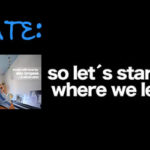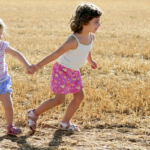The following is from The Atlantic 5/26/22 issue:
A conversation with Michelle Palmer, a social worker who specializes in grief and trauma
I called Michelle Palmer, a licensed independent clinical social worker and the executive director of the Wendt Center for Loss and Healing, a Washington, D.C., nonprofit that specializes in the intersection of grief and trauma, to discuss how parents can address the Uvalde shooting with their children right now and in the weeks that follow.
Our conversation has been edited and condensed for clarity.
Caroline Mimbs Nyce: Let’s start with the youngest children. Is there an appropriate age to start talking with your child about tragedies like the one that happened in Texas?
Michelle Palmer: I wouldn’t say there’s an appropriate age, just because kids develop at such different rates, both intellectually and emotionally. I know that that’s a little bit of a cop-out answer, but parents really do know their kids best.
What’s important, especially for the littles, is being aware that somebody is going to say something to them because they live out in the world—be it another kid, be it an older sibling.
For little kids, really what it will be for them is around: What does this mean for me? Am I safe? Can that happen to me? For those 5 and up, I would say—although again, that’s not a hard-and-fast rule—it’s really about reassuring them.
It’s about: “Something happened, and a grown-up went somewhere that he wasn’t allowed to go, and he hurt some people that he didn’t even know. And everyone’s really sad about it, because people shouldn’t get hurt.”
Nyce: Are there particular words or vocabulary you would use?
Palmer: It depends on the situation. For this, because kids don’t know the kids and families impacted, I’m not sure I would even say died at first. I think I would just say got hurt and leave it at that.
Now, kids may follow up with “Are they gonna be okay?”So you don’t want to lie. You give accurate information, but just enough. If they follow up, answer it honestly. If you don’t know what the answer to the question is, you can say that.
So, for instance, if they follow up with “Oh, are they gonna be okay?,” you can reply with “You know what? Sadly, no. Some of them actually died.” Little kids don’t know what dead means, so then you’re in that conversation.
Nyce: How do you describe dead to a kid?
Palmer: For little kids, they may have had an experience with a fish dying or a dog dying or a cat dying, so you can draw that parallel. If not, it’s “when your body stops working.”
Nyce: It’s very literal.
Palmer: Very, very literal. I usually do it in a way that I tie it to stuff that kids can relate to. So if the kids are little, like 3 or 4, that means that “Daddy’s not going to come home anymore for dinner” or “Daddy’s not going to pick you up from day care anymore”—stuff that is very concrete and stuff that they can understand because it’s in their language. It’s in a way that’s Oh, that’s how that impacts my life. Because little kids are very concrete thinkers.
And then it’s not at all abnormal for little kids to go to those questions and those feelings like a moth to a flame—just for a minute, before it gets too hot. And then they’re going to flitter away, and they’re going to go play. And that’s really normal. Oh my God, is my kid a sociopath? Nope.
Why aren’t they sad? They are sad—they are sad for as long as they can be.
Nyce: What are some of the ways parents can expect that younger kids might process the news?
Palmer: It really will be around How does this impact me? Am I okay? They will likely see a little bit more worry, a little elevated feelings of anxiety.
It’s probably more that because they’re not immediately impacted. For little kids for whom the death is of a significant person in their life, it’s not at all abnormal to see disruptions in sleep and eating and an increase in irritability. All of those things are ways that kids let us know that, emotionally, they’re struggling. But we see that really much more frequently when the death has an immediate impact on a kid, like with a close family member or friend.
This is terrible—I hope in no way does it sound like I’m minimizing the massiveness of this. But for kids who are not directly impacted, it really is about Am I okay? Are you okay? Are my people okay?
Read: Seven autumns of mourning in Newtown
Nyce: How do you talk about it in a way that they can understand, while balancing the risk of scaring them?
Palmer: It’s important within that conversation to talk about all of the ways that people keep them safe.
Kid: What if a grown-up came in my school?
Parent: Well, here are all the things that your school and your teachers do to keep you safe. Here are all the things that Mommy and Daddy or Grandma, Auntie, whoever do to keep you safe.
And then just do a couple:
Parent: Are you allowed to cross the street without looking both ways?
Kid: No.
Parent: How come?
Kid: ’Cause that’s not safe.
Parent: Exactly. That’s a way that we keep you safe.
So just giving concrete examples. One of my colleagues has an 8-year-old that she had to talk to this morning about it. And he’s a pretty anxious 8-year-old anyway. He was going to occupational therapy. And she said, “Look, Ben, the door is locked. This is a way that everybody keeps each other safe.”
Nyce: In general, is it better to wait for your child to come to you with questions or to initiate that conversation yourself?
Palmer: I think most parents would like the information to come from them first. Now, remember, your kids are going to pick up on the tone and the mood. So certainly you are not going to deliver this with jubilation, but you also don’t want it to sound like it’s the end of the world—because you’re going to scare your kids if you deliver it that way. It’s around What is the information that we want our kids to hear from us?
If you think they’re going to find out that it was a school shooting, you can say, “A grown-up went into a school that they weren’t allowed to be in and hurt some kids and some grown-ups.”
Nyce: Let’s talk about slightly older kids now. What would an approach there look like? How might it differ from a conversation with younger kids?
Palmer: They’re going to be able to sit in the emotion a little bit longer. They’re going to have a more sophisticated understanding. And so they will follow up with questions. How many people died? Especially that sort of middle-school age. They may ask some of the questions like How old were the kids? What grades were they in? What kind of gun was used?
Nyce: And you want to be honest with them?
Palmer: You do want to be honest. But you don’t want to be overly detailed unless asked. What kind of gun was used? A very reasonable answer to that is “I don’t know. I was not there. The news is reporting blah blah blah.” And leave it at that. I actually have a really strict no-news rule in my house. There’s very little in the world I can control, but what comes into my house is one of those things.
Nyce: Lastly, I wanted to talk about teens. How might an ideal conversation with them look?
Palmer: That is a much more sophisticated conversation: “This is what happened. I’m sure you’ve seen it on the news. I’m sure you’ve talked about it with your friends. What is it that you’re thinking and feeling around that?”
Both with the middle-school kids and the high-school kids, do some reality and accuracy testing around what they know. Invite that conversation: “What do you know? What are you guys talking about?”
It is an opportunity to say“Are you talking to your friends about how they’re feeling? Are you listening? Are you sharing how you’re feeling? It doesn’t have to be with me. But is there a trusted adult that you can talk with about this and about how you’re feeling?”
Our kids are compromised anyway because of COVID. We’ve got kids who are struggling with anxiety at a rate that is pretty significant. So this is just another layer of something terrible. So really trying to validate, like, “You guys have had to manage so much, and so much has been asked of you. I would be surprised if you weren’t worried, if you weren’t anxious. I’m not asking you not to be. What I am asking is that you have ways to cope with that so that you are not hurting yourself or others.”
Nyce: How do you comfort an older child that might be afraid to go to school after an event like this?
Palmer: Somewhat similar to the younger kids. “Let’s talk about the things that your school does to keep you safe. Let’s talk about the things that you do to keep yourself safe. Do you know where the exits are? How you’ll get out a window?” Especially for those older kids, those teenagers, a feeling of self-agency is really important, both just developmentally, but also in the context of so many things feeling out of their control. Normalizing that: “Yep, it makes all the sense in the world that your antennae are up. What are the things you have found that work to help bring those antennae down again?”
Kids navigate feeling unsafe all the time, and they manage it. They can use the same exact strategies. And if those strategies don’t work:“Let Mom or Dad or whoever know, and we’ll come up with some different ones that you can try.” It is about helping them figure out their own power, both in keeping themselves safe, but also in how they regulate when they are feeling overly anxious.
Nyce: If after this, your child comes home and says they had a lockdown drill, or maybe a real lockdown, would you be prepared to have another conversation with them, knowing that they now have the Texas shooting in the back of their minds?
Palmer: That question is a really important one because these conversations are very likely not going to be one-and-done. This will be in a news cycle for a while. Kids will continue to talk about it. You can say, “I’m going to check in with you periodically, and if you want to check in with me periodically, we can make that agreement”—so that they don’t think, Oh, well, we already talked about it.
Nyce: I can only speak to my own experience as a kid, but I feel like it’s easy to ruminate on this stuff.
Palmer: It really is. And teenagers don’t want to sit there and have heavy, deep, and real conservations with their parents, as a general rule. So there may be some harrumphing and rolling of the eyes. And what I tell parents is, do it anyway and keep doing it. They’re teenagers. That’s what they’re supposed to be doing.
Nyce: A lot of parents may be dealing with fears or grief of their own. How do you protect your children from feeling scared while still being honest with them and processing your own emotions about the shooting?
Palmer: I think honesty takes the day on this one. “I’m really sad too.” “I’m really mad too.” “I’m really scared too.” Parents are like, “I don’t want to cry in front of my kid”—especially dads. It’s, like, no, no, no. If what you can do is destigmatize crying—for your boys particularly—and help them understand that this is just the way your body expresses emotions, you are modeling the exact right behavior.
There is a balance there. Completely falling apart and getting dysregulated is going to scare your little kids, and it’s going to make your older kids feel like they have to take care of you. So you want to modulate and be able to manage yourself.






























